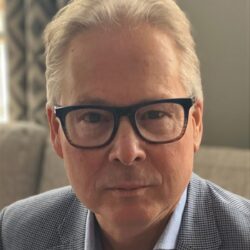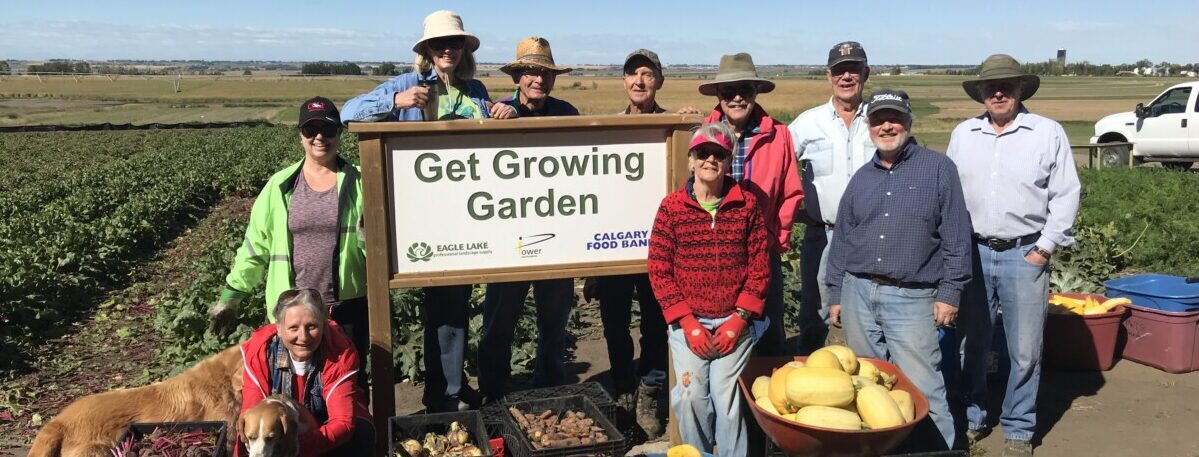There are close to 200 members in our Chapter and many more supporters. In this regular feature of the Pipeline, we will introduce you to long-serving members who have shaped the profession and the Chapter. Our Finders will introduce you to some of the newer Chapter members and people you may meet in one of our upcoming events
Member Profile – Founder:
John Phin

John Phin is among the founding members of the AFP Calgary & Area Chapter, and that dates back to 1995 when Calgary joined what was then the National Society of Fundraising Executives – NSFRE. John spoke to the Pipeline from his home in Calgary’s Deep South, where he and his wife and cats enjoy an idyllic view of the river valley. Here’s our conversation:
What were your early career ambitions?
“I’m not sure I had any. I had always been able to write and on that basis, I was drawn toward the Journalism program at Ryerson, in Toronto. Mrs. Solovew, my English teacher at York Mills Collegiate, was an absolute inspiration! That started everything.” John graduated from Ryerson, in their renowned Journalism program. That program included three areas: Reporting, Broadcast, Public Relations and Publicity. “I loved that part – the PR and publicity side and that’s where I wanted to go. I was never going to be a newspaper reporter.” John got a taste for it through a summer internship with the Ontario government, writing promotional copy for historical sites. That led him to a position with the Toronto Public Library as a Publicity Assistant after graduation. He stayed with TPL for five years, when in 1984 a new opportunity opened up.
How, and when, did you get your start in fundraising?
“I started in the sector in 1984, and like many of our colleagues, I didn’t come straight into it.”
However, it was through connections with his father who was the Medical Director at a hospital in Hamilton that he connected with CCS, a strategic fundraising consulting firm out of the United States that had operations in Canada and was hiring staff. “I think we agreed being able to write was a necessary consulting skill.” John says. “Back then, it was trial by fire. We were paired with ‘experienced’ staff (one or two campaigns under their belt) and guided through what was essentially a step by step approach to capital campaigns. It was all very tactical. Lead by some very hard-assed characters from the US.” It was a great learning experience and training ground. There was a very small pool of professional fundraisers in Canada back then. Most of the CCS staff were from the U.S. All were white and male. Women didn’t crack into the ranks for several years. Much like his work at the Toronto Public Library, John got to do everything in fundraising. “It was primarily capital campaign focused with all its many parts, but there were also studies to do, and later on more variety in the types of clients to work with.” CCS was a big player in Canada. There were a few others; The Goldie Company had started up, Ketchum Canada was operating, and people like Ken Wyman were leading lights. Volunteering was very traditional. A lot of the campaign committees were run by women, wives of doctors and lawyers, who were very influential in the community. “It was all very typical of fundraising in the 1980s.”
“I don’t feel that my career has been as a fundraiser, it’s been more grounded in fund development – about pulling all the parts together to make the system work. The organization of departments and offices of to bring all the components together. And that came from starting off as a consultant.”
After CCS, John carried on in consulting and went to work for the Martin Group and after that, moved into the organizational side. He and his family moved to Regina to work with Luther College. He was there for four years as Director of Development and seconded to work on a mega capital campaign at the University. From there it was on to Calgary and a position in Planned Giving with United Way.
John speaks of how his background in consulting colours the way he looks at our profession. “I have a hard time seeing fundraising as a discrete, stand-alone entity. It needs the communications piece, engagement, and an organizational strategic position. It can’t be done alone.”
In another position, John took the Corporate Relations portfolio with the University Of Alberta School of Business working with the Dean, Mike Percy. For those who knew him, they will know that Mike was a strong force at the university. It was a very interesting position. “My work has always been project oriented. I was hired to accomplish certain things. The mission of the organization never consumed me; I was there to make things work.”
What was the first cause you raised money for?
John’s first client was Joseph Brant Memorial Hospital in Burlington, Ontario. His first big assignment was organizing the medical staff phase of the campaign and coordinating their solicitation.
Did you have a great awakening or “aha!” moment that changed the trajectory of your fundraising career?
“I think so, but I would be hard-pressed to put a pin in it. The shift from consulting to working in an organization is probably what spurred the “aha” moment and any change as a result. I got to apply all of the things I learned in consulting and I was inspired when I started to read the work of leaders in the field, like Henry Rosso. Reading these fundraising books that were out there, I started paying attention to the structures that they were proposing based on philanthropic principles. Things I hadn’t thought of to be honest.”
Who was your favourite client or employer?
“I would say the one that stands out most was United Way here in Calgary, because of their strong campaign leadership. Ed Johnson and Heather MacDonald. They knew what they were doing, and they knew the community well. Calgary United Way was a leader among United Ways in Canada and the people involved had the respect of others in United Ways across the country. At that time, the organization wanted to change how leadership giving might be expanded and along the way increase its endowment. This work was early in the field of endowment building and planned giving. I got to work with Wayne Stewart on endowments and John Armstrong building the program. I was recruited from Luther College to pull together the pieces in the fundraising to add planned giving to the annual campaign. Then there were other people that passed through – little slices in my professional life, like Raffi Cavoukian and his work on child honouring. Brilliant. I got to work with First Nations people and experience something of the culture when I was in Regina, through what is now First Nations University and people like Charles Pratt who I learned a lot from when he was the development person and later its president.”
Did you have a mentor, or someone whose advice you followed and appreciated?
“Early in my life, I had my English teacher and a great guidance counsellor.” That, combined with the fact that John’s mother was a teacher, played a strong start in the path he followed. “They steered me in a direction that would provide me with a creative outlet. That started with writing and journalism and then a natural transition into the non-profit sector.”
Later as I progressed in my career there were great influencers and people who helped make things clear. A colleague, David Jeu, once told me that there are two kinds of fundraisers – missionaries and mercenaries. The missionaries are zealots for the cause; the ones who live, breathe and bleed the mission of the organization. On the other hand, the mercenaries are the ones that are project oriented. These are the ones that bring a set of skills and tools to the table to help organizations succeed. That’s the way I always viewed my work, by consolidating the pieces and filling the voids in fund development to make the whole process work.
Kevin Allen at CCS was a hard-nosed, hard-assed New York fundraiser, but he had a lot of patience for me. After my time at CCS, I joined the Martin Group where I learned a lot from Pamela Capriotti who led the communications team. Pam made it clear the important role of communications in fundraising. Ed Johnson at United Way, Mike Percy at U of A; Sherrold Moore, they were all influencers. I learned that fundraising doesn’t exist on its own. You need to understand the interconnectedness of all the parts that make up fundraising. Take for example, events, and asking what is the strategy behind the event and how is this connecting us with our donors? Nancy Palmer was also an influencer who convinced me to join the Calgary Health Trust, and fortunately Gary Durbeniuk agreed with her! Phil Levson convinced me to look at the position at Hull Services, and I finally did, and it was a good move for the experience it gave me.”
In hindsight, is there anything you would have done differently?
“I take what people say to me as gospel, that is to say that I have a rather naïve belief in what they are saying. Sometimes that has caused problems. I may not have read those people properly and been burned, or caused me to have to spend precious time correcting things. I was always focused on getting the job done, moving things forward. I guess I would have spent more time getting to understand where they were coming from. Another good lesson learned. But in terms of my experiences, I wouldn’t change anything. There were so many great things to do and great people you get to know along the way. I got lucky! I stumbled into this profession and it’s been fantastic. There is nothing else I would have wanted to do instead.”
How has it been, as a male in a female dominated industry?
“Really interesting. Often times difficult to navigate, not being surrounded by a lot of other males. It can feel, at times, lonely. I never felt it was a power thing; I grew up with a lot of strong women. It does bother me that there isn’t universal equity in our profession, it makes no sense to me. Male or female, we’ve got a job to do here, so let’s dig in and get it done. That’s the way I’ve always seen it.”
What got you involved with AFP?
“That’s an old Toronto thing. I had been a member of NSFRE (the forerunner to AFP) and when I came to Calgary I got involved with the group here, that were starting up the chapter. There wasn’t much in Regina, though at one time I was the Canadian President of the Association of Lutheran Development Executives – bigger in the US, but not so much in Canada. So I guess I had some professional association experience.
Like everyone, I started by joining a committee or two in Calgary and was continually inspired by the true leadership in the chapter, people like Andrea McManus, Gloria Stewart, Joan Black, Brian Duclos, and Stephen Franklin. Stephen and I did PD&A together and it was just plain fun.
I will always be a proponent of the organization that I see as being able to raise the profile and visibility of the profession, and actually making changes to how the public sees us. Get rid of the snide connotations to the “oh, you’re the fundraiser” comments that one hears. Maybe I can help by promoting the CFRE designation to move the profession forward.”
What inspires you now?
I’m seeing AFP as a real force in raising the profile and visibility of our profession, how we are regarded and influencing what others think of us. We have failed to educate people, CEOs, board members, donors, about the profession even though there are endless white papers out there proving that fundraising is a profession. So, it is disturbing that a donor can feel free to grab your butt, make inappropriate gestures, or dismiss you because you’re “just a fundraiser”. As opposed to treating us like the professionals that we are. That happens not only with the nasty donors or volunteers, but within staff groups in some organizations. The way I see it, the work we do is comparable to any of the other professions. We need to move the needle on this, and I would love to see us really ‘crack the back’ on this. It may mean the coming together of all the powerful parts of our association. We’ve got some wonderful people in Calgary and across Canada that be the influencers and change-makers for the next generation of fundraisers – like Cindy Ngo and other new fundraisers – I want them to work and thrive in an environment that values them as professionals.”
Any wise sage words for the people coming up the ranks in fund development?
“Surround yourself with well-motivated people. Keep learning! There is always something to learn.
And be involved – you can’t just sit on the sidelines and do nothing. There is a huge upside to being involved. Show up, participate, voice your opinion.”




